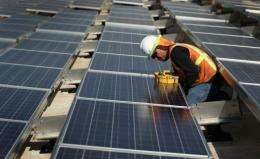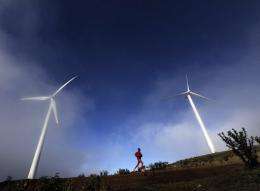Under US, Asia-Pacific to focus on green trade

The United States, taking the helm of the APEC forum, hopes to spur green growth in the Asia-Pacific region by knocking down trade barriers on environmental goods, a senior official has said.
Top officials from the 21-member Asia Pacific Economic Cooperation forum are meeting this week in Washington to kick off a year that will culminate in a November summit in Hawaii. Secretary of State Hillary Clinton will address the forum on Wednesday to outline the US strategy.
Muhamad Noor, executive director of APEC, said Tuesday that the United States wanted to produce "deliverables." Last year's summit in Yokohama, Japan, called for progress on a long-mooted idea of a trans-Pacific free trade zone.
Noor, a veteran Malaysian trade negotiator, said that President Barack Obama's administration was putting a priority on green growth and on helping both sides of the Pacific to "transition to a clean energy future."
"APEC will accelerate efforts to address barriers to trade in environmental goods and services," Noor told reporters.
"It will also seek to remove barriers related to the importation of advanced technology demonstration products such as vehicles and remanufactured and recycled goods."
APEC includes China and the United States, which are by far the world's two biggest emitters of carbon blamed for the planet's steadily rising temperatures.
Noor said that APEC, sometimes criticized as a talking shop, did not intend to supplant the United Nations Framework Convention on Climate Change which is leading talks on an elusive successor to the Kyoto Protocol, but would seek to boost trade.
"If you are able to make this technology available to the developing nations, I think it will be a major contribution to the environment," Noor said.
"APEC will continue to work in our traditional way, building consensus on this."

Most nations agree on the need for technology transfer, but the details have been controversial during climate negotiations.
Wealthy nations want assurances that developing economies will respect intellectual property rights. Many developing states, meanwhile, say climate assistance should not be a substitute for wealthy states curbing carbon emissions.
UN-led talks in December in Cancun, Mexico, made headway, with nations agreeing to set up a new fund under the World Bank to administer billions of dollars in climate assistance.
However, the US Republican Party, which trounced Obama's Democrats in November congressional elections, is deeply skeptical of international efforts to combat climate change.
Noor said that the Obama administration also wanted to work at APEC to improve the regulatory environment and to develop a "more concrete vision" of the proposed APEC-wide Free Trade Area of the Asia Pacific.
In Yokohama last year, the United States and eight other Pacific Rim nations separately set a goal of forging their own free-trade pact -- called the Trans-Pacific Partnership (TPP) -- in time for the APEC summit in Hawaii.
Negotiators met in Chile in February and will gather again next month in Singapore on the TPP.
Australian Prime Minister Julia Gillard, who is visiting Washington, called the TPP a "key economic opportunity."
"Every so often we take a large step forward on trade arrangements -- and the TPP is shaping up as one of these," Gillard said at the US Chamber of Commerce.
But activist groups critical of free trade agreements have urged negotiators to release texts from the TPP, saying that the vast majority of people who would be affected by the deal are being left in the dark.
The TPP talks involve Australia, Brunei, Chile, Malaysia, New Zealand, Peru, Singapore, the United States and Vietnam. Prime Minister Naoto Kan also wants Japan to join talks but he faces staunch opposition from farmers.
(c) 2011 AFP




















